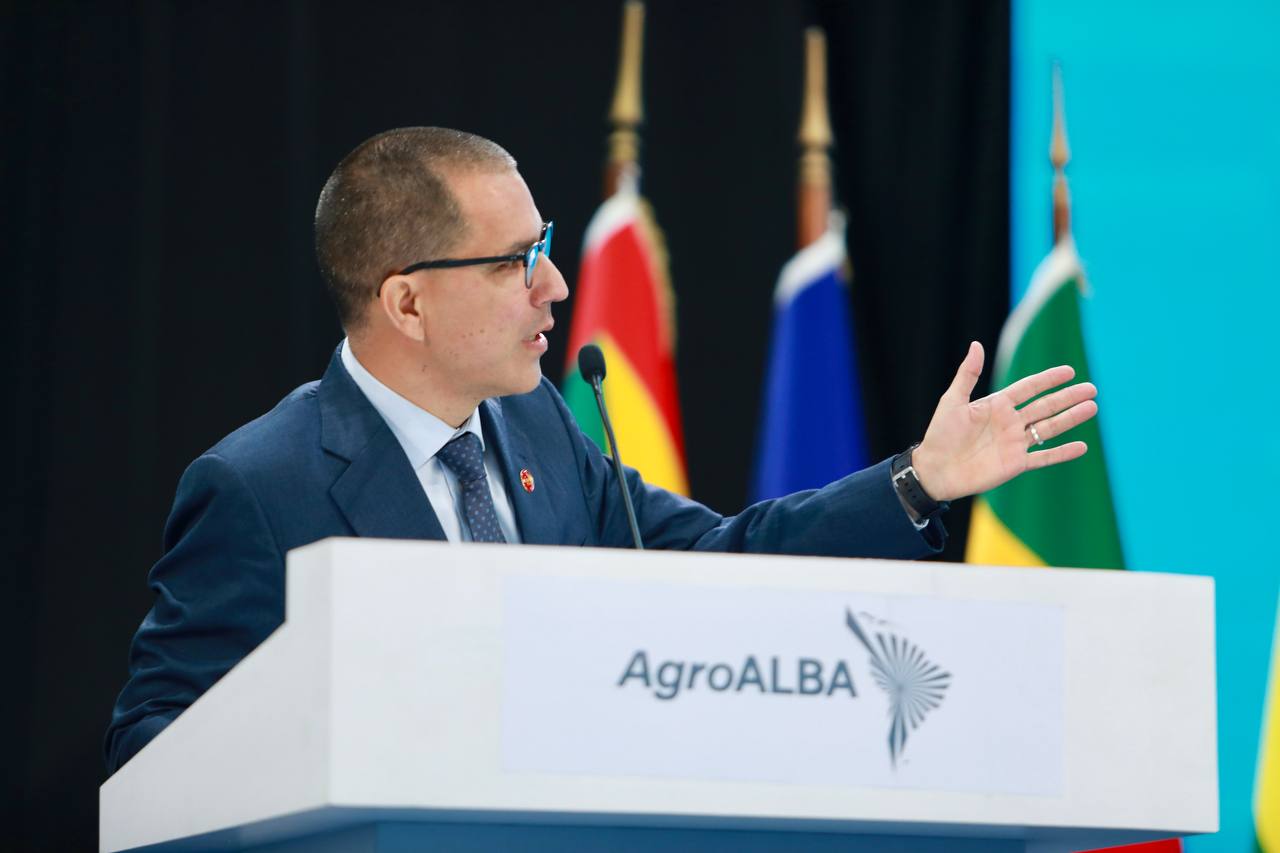Caracas, June 5, 2025 — Cooperation and complementarity are the cornerstones proposed by the President of Venezuela, Nicolás Maduro, for the conception of Agroalba, a vital program of the Bolivarian Alliance for the Peoples of Our America–Peoples’ Trade Treaty (ALBA-TCP).
This was stated on Thursday, June 5, by the Executive Secretary of the regional bloc, Jorge Arreaza, during the inauguration of the First Agroalba Expo-Fair, which is being held until June 6 in Caracas, Venezuela.
“These ideas, now becoming a reality, had already been circulating in the minds, projects, and plans of Commanders Hugo Chávez and Fidel Castro (…) We believe Agroalba is in good hands.”
Arreaza affirmed that the first steps led to the creation of ALBA Alimentos, and later, the proposal for Agroalba emerged with the aim of strengthening the region’s food sovereignty in light of the new global geopolitical landscape.
According to the Executive Secretary, this program of the Alliance will enable member countries of the regional bloc to join efforts in food production and achieve productive independence.
Initial agreements have been signed between Venezuela and Saint Vincent and the Grenadines; also with Antigua and Barbuda; as well as with São Tomé and Príncipe, an African nation.
Arreaza emphasized that, for the first time, Ministers for Agriculture and Fisheries from the region are meeting in Caracas to mark the first steps of Agroalba and promote the food and life sovereignty of the peoples of Our America. “This is an alliance for life,” he concluded.
Visions of Agroalba
The conference What is Agroalba?, led by Venezuela’s Minister for Productive Agriculture and Lands, Julio León Heredia, marked the opening of the first Agroalba 2025 Expo-Fair, an event held in Caracas on June 5 and 6, following the initiative of President Nicolás Maduro and the Executive Secretariat of the Bolivarian Alliance for the Peoples of Our America–Peoples’ Trade Treaty (ALBA-TCP), headed by Jorge Arreaza.
León Heredia emphasized that the origin of Agroalba lies in the value of integration promoted by the leaders of the regional bloc. “This is the key element to build a model of alliance and productive development, taking into account ALBA’s potential,” he added.
He stated that the Agroalba program is open to friendly countries, even those not part of the bloc, with the goal of achieving independence and food sovereignty. “We are at the perfect moment to reach this goal,” he noted.
The Minister affirmed that Venezuela is offering all the nation’s potential to ALBA-TCP countries and friendly nations around the world to achieve important goals. He mentioned that more than 3 million hectares are available for plant production and over 13 million hectares for livestock, among other sectors.
Cooperation in the face of the climate crisis
What is ALBA Azul? was the title of the second conference, delivered by Venezuela’s Minister for Fisheries and Aquaculture, Juan Carlos Loyo, who began by highlighting that, in the face of the climate crisis, the Bolivarian nation proposes gathering the entire network of ALBA-TCP scientists to design strategies for aquatic food production that meet the nutritional needs of the member countries.
In the area of trade, he also stated that, as a bloc, “we need to harmonize our sanitary export certificates. Move toward a unified policy that standardizes (trade) criteria,” Loyo explained.
ALBA Azul is an initiative to promote comprehensive fishing and encourage the export of seafood produced in the region.
He further pointed out that the Caribbean Sea is classified as independent and has strategic significance for the sustainable use of maritime resources. It is the seventh largest sea in the world and is home to more than 12,000 species. ALBA Azul, therefore, is the initiative for joint development in fishing and aquaculture, he emphasized.
The third conference of the expo-fair, titled Made in Venezuela, was led by the President of the Marca País Institute, Daniella Cabello. She recalled that ALBA was born as a response to neoliberalism, drawing strength from the struggle for the freedom and sovereignty of the peoples. “This is the same conviction of Marca País and Made in Venezuela,” she stated.
Finally, she asserted that Venezuela possesses all the strengths needed to ensure food production, in collaboration with the Bolivarian Alliance. She highlighted that the country has a wide variety of products grown on its land, with highly qualified producers committed to advancing Agroalba.
